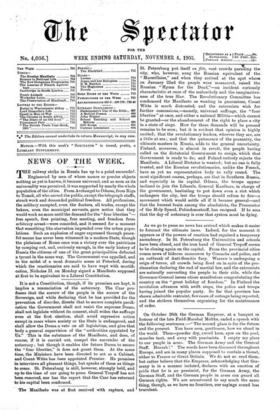T HE railway strike in Russia has up to a point
succeeded. Engineered by men of whose names or precise objects nothing as yet is known, it became universal, and as soon as its universality was perceived, it was supported by nearly the whole population of the cities. From Archangel to Odessa, from Riga to Tomsk, all who served the public, except the telegraph staffs, struck work and demanded political freedom. All professions, the military excepted, even the doctors, all trades, except the bakers, even the municipal servants, gave notice that they would work no more until the demand for the "four liberties "- free speech, free printing, free meeting, and freedom from arbitrary arrest—were conceded, and it seemed for a moment that something like starvation impended over the urban popu- lations. Such an explosion of anger expressed through peace- ful means has never been witnessed in a modern State, though the plebeians of Rome once won a victory over the patricians by camping out, and, curiously enough, in the early history of Russia the citizens of one of the great principalities defeated a tyrant in the same way. The Government was appalled, and in the midst of a most dramatic scene at Peterhof, during which the reactionaries are said to have wept with mortifi- cation, Nicholas II. on Monday signed a Manifesto supposed at first to be equivalent to a Liberal Constitution.


























































